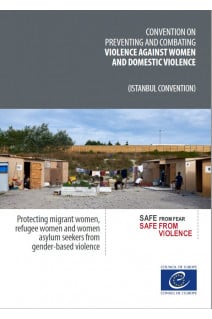



Migrant women, with or without documents, and women asylum seekers are particularly vulnerable to gender-based violence. Although their reasons for leaving their country vary, as does their legal status, both groups are at an increased risk of violence and face similar difficulties in overcoming such violence. That is why the Istanbul Convention ensures that its provisions are implemented without discrimination on the grounds of migrant status, refugee status or other status (Article 4, paragraph 3).

Migrant women, with or without documents, and women asylum seekers are particularly vulnerable to gender-based violence. Although their reasons for leaving their country vary, as does their legal status, both groups are at an increased risk of violence and face similar difficulties in overcoming such violence. That is why the Istanbul Convention ensures that its provisions are implemented without discrimination on the grounds of migrant status, refugee status or other status (Article 4, paragraph 3).
